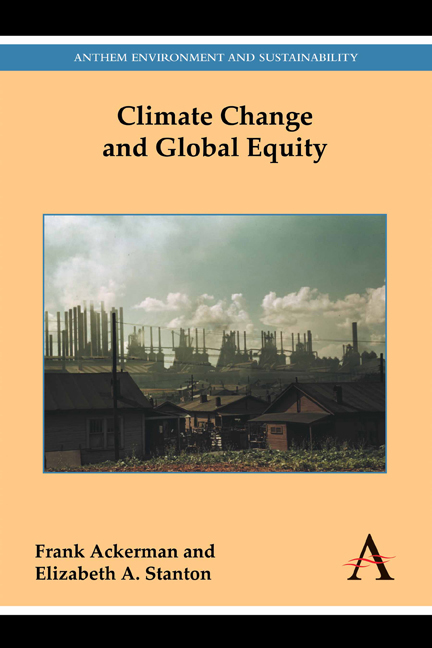Book contents
- Frontmatter
- Contents
- Introduction
- Publication History
- Part I Perspectives on Climate and Equity
- Chapter 1 Climate Economics in Four Easy Pieces
- Chapter 2 Carbon Markets Are Not Enough
- Chapter 3 Modeling Pessimism: Does Climate Stabilization Require a Failure of Development?
- Chapter 4 The Tragedy of Maldistribution: Climate, Sustainability and Equity
- Part II Analyses of Climate Damages
- Part III Theory and Methods of Integrated Assessment
- Part IV Applications of Integrated Assessment Models
- Appendix Supplementary Data for Chapter 3
- Notes
- References
Chapter 4 - The Tragedy of Maldistribution: Climate, Sustainability and Equity
from Part I - Perspectives on Climate and Equity
Published online by Cambridge University Press: 03 November 2017
- Frontmatter
- Contents
- Introduction
- Publication History
- Part I Perspectives on Climate and Equity
- Chapter 1 Climate Economics in Four Easy Pieces
- Chapter 2 Carbon Markets Are Not Enough
- Chapter 3 Modeling Pessimism: Does Climate Stabilization Require a Failure of Development?
- Chapter 4 The Tragedy of Maldistribution: Climate, Sustainability and Equity
- Part II Analyses of Climate Damages
- Part III Theory and Methods of Integrated Assessment
- Part IV Applications of Integrated Assessment Models
- Appendix Supplementary Data for Chapter 3
- Notes
- References
Summary
This essay is an initial exploration of the dimensions of the equity/sustainability linkage from the perspective of public goods analysis. Sustainability requires an abundance of public goods. Where these commons lack governance, sustainability is at risk. Equity is a critical component of sustainability that can itself be viewed as a public good, subject to deterioration (maldistribution) when left ungoverned. As is the case for so many forms of environmental degradation, the private benefits of maldistribution tend to overshadow the larger social costs, and the result is a degradation of equity. This chapter sketches out the analogy of equity as a public good by: examining the evidence regarding current and historical income equality within and between countries; introducing the characteristics of public goods and grounding equity in this idiom; reviewing several theories explaining the suboptimal provision of environmental goods; applying these theoretical frameworks to the case of equity, with an examination of the potential causes of, and solutions to, maldistribution; and, finally, addressing equity's critical role as a component of sustainability in the case of climate change, with implications for climate policy.
Introduction: Equity and Sustainability
Analysis of public goods has long dwelled within the purview of environmental economics. But the breadth of the commons extends far beyond natural resources and pollution sinks to radio frequencies, the collected works of Shakespeare and ownership of the moon (Barnes 2006). Even starting from the more narrow vantage point of environmental amenities, the language and logic of sustainable development connects environmental protection with the broader set of public goods related to the advancement of social welfare. The Brundtland Commission's (World Commission on Environment and Development 1987) definition of sustainable development as meeting “the needs of the present without compromising the ability of future generations to meet their own needs” explicitly referenced the central role of access to and distribution of resources, noting that “physical sustainability implies a concern for social equity between generations, a concern that must logically be extended to equity within each generation.” Sustainability requires a robust commons (or an abundance of public goods). Where these commons lack governance, sustainability is at risk. Equity is a critical component of sustainability and can, itself – as I argue in this initial exploration – be viewed as a public good, subject to degradation when left ungoverned.
- Type
- Chapter
- Information
- Climate Change and Global Equity , pp. 37 - 54Publisher: Anthem PressPrint publication year: 2014



